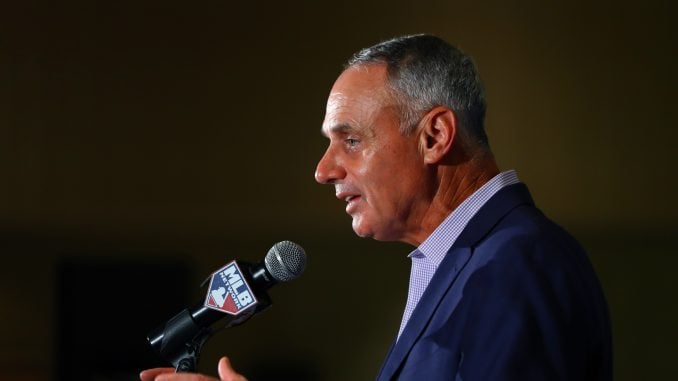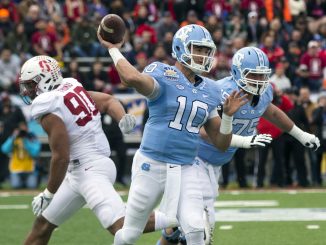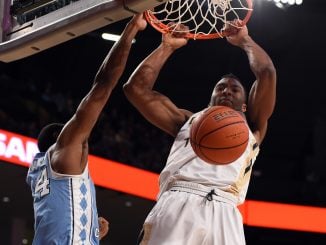
There is contentiousness. There is drama. There is suspicion.No, we aren’t talking about the Washington, D.C., political scene. We’re talking about baseball. And while it comes nowhere close to what’s going down in the nation’s capital, it still is very real: Witness the tug-of-war between ownership and the Major League Baseball Players Association unfolding over rule changes to speed the pace of play in the game.Commissioner Rob Manfred pulled back the curtain on it on Tuesday as he took questions on the state of the game from the media in Phoenix. It wasn’t more than two minutes before he said, “Unfortunately, it appears there won’t be any meaningful change for the 2017 season due to a lack of cooperation from the MLBPA.”As he begins his third season as commissioner, this is perhaps the most forceful Manfred has been. Ownership and the union were able to reach a collective bargaining agreement in the fall, so the sides are able to negotiate. However, clearly there are some residual feelings from the interaction.Manfred — and thus ownership — wants to take measures to speed the pace of games. He said that home runs are up 32 percent since 1980 and strikeouts are up 67 percent, so balls in play are at a record low.”I’ve tried to be clear that our game is fundamentally sound, and it does not need to be fixed,” he said. “At the same time, I think it’s a mistake to stick our head in the sand and ignore the fact that our game has changed and continues to change.”Here are some of the ideas Manfred endorses: a 20-second pitch clock that has worked effectively to improve pace in the minor leagues, and altering penalties for violations of it; limiting the number of trips to the mound; issuing intentional walks without throwing pitches; and altering the strike zone in a way that pitchers must throw more hittable pitches.The intentional-walk change will go into effect for the 2017 season, ESPN reported Tuesday.MLBPA executive director Tony Clark said last weekend that the union favors making no changes, instead preferring to educate fans about the nuances of the game. Manfred said he rejects that idea and is prepared, under what he said are the terms of the CBA, to implement changes unilaterally for the 2018 season (some interpret this as “executive order”).”I’m firmly convinced that our fans, both our avid fans and casual fans, want us to respond to and manage the change that’s going on in the game,” he said. “I’m certain that our job as stewards of the game is to be responsive to fans.”If it is a curiosity that the players’ union is so resistant to changes that ownership wants, consider for a moment the MLBPA’s perception of things. Since agreeing on the CBA, the players have experienced an offseason of free agency that was not expected.Many top players didn’t get the kind of offers that came along in years past, and many had to settle for fewer dollars and fewer years. There were a surprising number of one-year deals and minor league contracts for long-time big-leaguers. Words like “collusion” have been whispered. And the players fear their percentage of the revenue is going down.The new CBA, with escalating taxes each time a club surpasses the luxury tax threshold, has changed something. New York Yankees general manager Brian Cashman — this is the Yankees, mind you — said the revised system is a little like working with a salary cap. The union agreed to it, but if clubs see it that way, it’s not good for player salaries.Nevertheless, the union’s lack of enthusiasm for moves to increase pace of games has Manfred taking a hard line.The 2016 season was plenty compelling with the Chicago Cubs winning their first World Series in 108 years at the end of a fascinating postseason. Interest didn’t wane despite the average length of a game going up by approximately four minutes. But the younger generation of would-be baseball fans, the social-media generation, has an insatiable appetite for more action, wanting the game to be as fast as can be.Baseball can grow by doing whatever it can to engage this group.And frankly, baseball doesn’t need every closer treating every pitch like an event. It doesn’t need pitching coaches going to the mound to stall for extra time so a reliever in the bullpen can get in five more warm-up throws.Taking away the four balls in the intentional walk will save little time and remove some unpredictability in the game. And at a time when swing-and-miss pitching is at its height of importance — and let’s face it that strikeouts are fun — changing rules to introduce more balls in play feels like forcing a shift in this living, evolving game.There is room for change.The idea here is that the sides are supposed to continue talks about the proposed rule changes over the course of the coming season before it comes to Manfred’s office implementing things unilaterally. If the union can warm things in the relationship as it appeared Tuesday, it could have real input into what changes for 2018.That’s what needs to happen. What’s best for the game will come from a meeting of the minds, not a Washington, D.C., sort of standoff.



